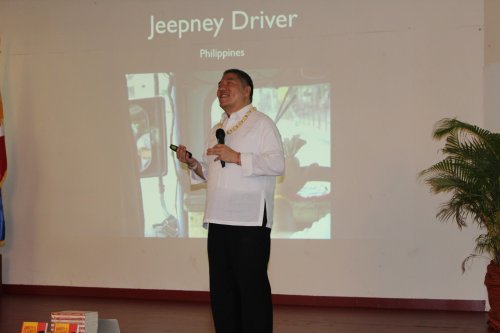
Prof. Ocampo lectures on “Mukhang Pera” at the Philippine Consulate General.
Filipinos in Hawaii have gained a deeper appreciation of Philippine history and culture after attending the three-part lecture series on money, Rizal and Marcos in various venues in Oahu, Hawaii by multi-awarded Filipino academic, historian, journalist and author Professor Ambeth R. Ocampo, who visited the island from 26 August to 1 September 2017, in celebration of Philippine National Heroes’ Day, which is held every August 30th.
Prof. Ocampo’s weeklong visit to Hawaii was supported by the National Commission for Culture and the Arts (NCCA) and was organized by the Philippine Consulate General in Honolulu, in partnership with the Filipino Association of University Women (FAUW) University the University of Hawaii (UH) Center for Philippine Studies, UH Leeward Community College School of Pacific and Asian Studies, East-West Center, the Knights of Rizal and Philippine Airlines.
The full-house lectures were as follows:
1. “Mukhang Pera: The Politics of Banknotes in the Philippines”, 29 August 2017 at the Philippine Consulate General in Honolulu
About the Lecture: “Mukhang pera” literally means “looks like money” but is often taken to denote a “greedy or materialistic person.” Prof. Ocampo’s lecture played on this double meaning by showing how politics influences history and the way it is represented in the banknotes of the Philippines.
Highlights of the Lecture: Prof. Ocampo said that banknotes are part of daily transactions that people often ignore the details each peso bill or coin contains, or the effort and tedious research that go into choosing the design. He also stressed that a banknote is important because its design is an expression of our national identity, and discussed how politics and public opinion influence the design of our money. Prof. Ocampo urged the audience to henceforth take a closer look at banknotes as these reflect our history and culture.
2. “Rizal in Dapitan: The Triumph of Life Over Death”, 31 August 2017 at the UH-Leeward Community College
About the Lecture: This year marks the 125th anniversary of Rizal’s arrival in Dapitan, his place of exile from 1892-1896. A lesser man would have crumbled in depression and boredom but Rizal turned his misfortune around and contributed to the development of the sleepy town through education and civic work that is the bedrock on which to build nationhood
Highlights of the Lecture: Prof. Ocampo demythologized Philippine national hero Dr. Jose Rizal through offering fascinating insights, lively anecdotes and little-known facts about the hero as a human, particularly how he lived in exile for four (4) years in Dapitan. Investigating Rizal’s own writings – his letters and diaries and other resources, Prof. Ocampo stripped Rizal’s so-called “overcoat” i.e. the countless myths and rumors that surround him, concluding that “in humanizing Rizal, we realize our capacity for greatness”.
3. “Interrogating Presidential Papers: The Ferdinand Marcos Diaries, 1 September 2017 at the East-West Center
About the Lecture: These handwritten diaries that span the years 1969-1984 were left when Ferdinand Marcos and his family fled from the presidential palace in February 1986 and have been in the custody of the Presidential Commission on Good Government since. Prof. Ocampo is preparing the diaries for publication, collating from different manuscript sources, and annotating from newspapers and the Official Gazette. In the process being critical of Marcos’ own view of events.
Highlights of the Lecture: How should we remember Ferdinand Marcos? How do we ascertain the legend, the prejudice and the truth? This was the crux of Prof. Ocampo’s lecture on one of the most polarizing periods in Philippine history: the Marcos years.
Prof. Ocampo expressed that reading primary-source materials and Marcos’ first-person accounts provide another version of the truth. He shared that at first, he was having second thoughts about venturing into the study of Marcos, for fear of hostile response, but decided to pursue it so that future historians and the next generations will have something to read about the pre-Edsa revolution era.
While generally biased, he said, historians should study different viewpoints so they may reconstruct the past. “History is about remembering; it is also about forgetting,” Ocampo said toward the end of his talk. “History is about hope, not despair”, he added.
Prof. Ocampo’s lectures in Hawaii brought together scholars and society figures, the culturati, members of the academe, Marcos loyalists, former university activists and walk-in folk, young and old alike, with some even attending all of his three lectures, which are known for being “anecdotal and well-researched, delivered in a conversational tone with fresh insights and witty sense of humor”, thus making history “more palatable and interesting to an otherwise bored and apathetic audience.”
Retired Brigadier General James Hirai, Deputy Director of the Daniel K. Inouye-Asia Pacific Center for Security and Strategic Studies, remarked that Dr. Ocampo’s lecture was entertaining and educational, and remarked, “I wish my university professors were half as delightful as he was and I wish they had treated their subject matter with such artful and provocative connections to current events.” (END).

